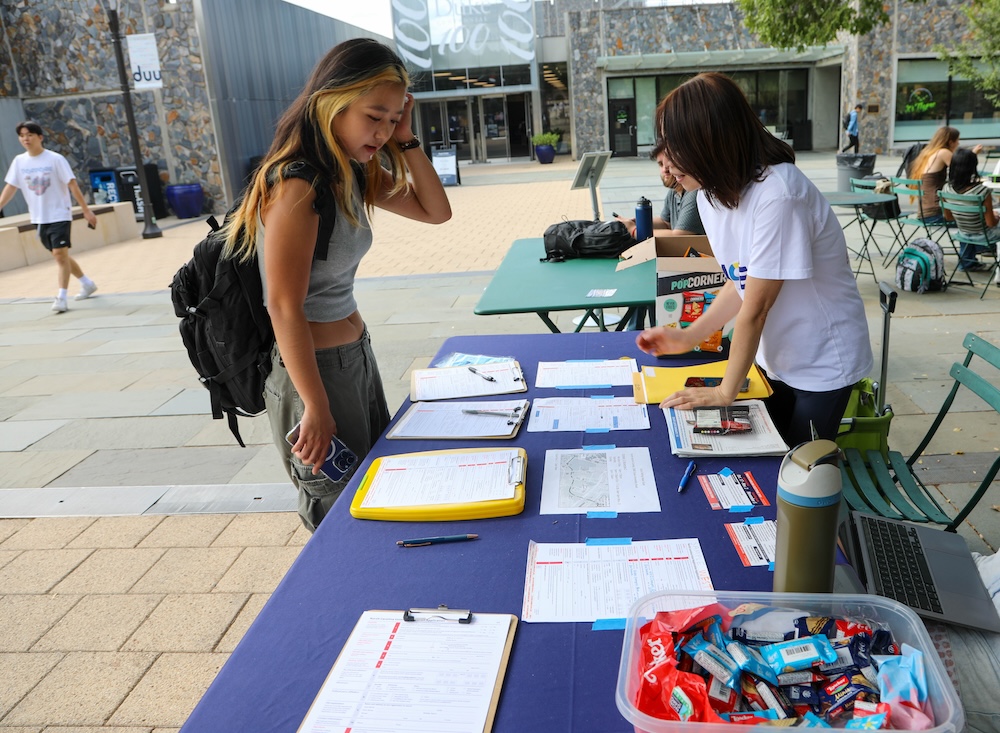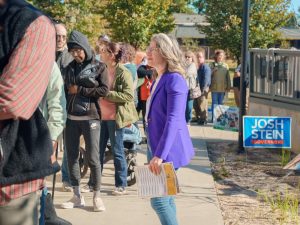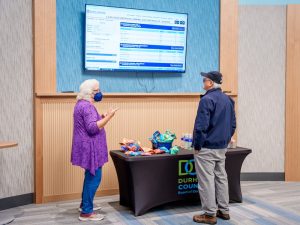Editor’s note: Since this story was published, the state Court of Appeals has ruled in favor of the state Republican Party in its suit against the state Board of Elections. The ruling means that UNC-Chapel Hill students and employees are barred from using digital IDs at the polls.
UNC-Chapel Hill has been at the center of a controversy over student voting access. Last Thursday, the state Republican Party and Republican National Committee filed suit against the state Board of Elections for approving UNC’s digital student ID for voting.
But just a few miles away at Duke University, students face a different set of voting obstacles. Administrators are scrambling because the school’s digital ID — routinely used by most students — was rejected by state elections board staff in late August.
Student votes are a contentious issue in battleground North Carolina, where Kamala Harris and Donald Trump are running neck-and-neck. At Duke, many students are eager to vote, but are confused by the logistics. At the heart of the confusion lies the question of student IDs.
“For a Duke student, you practically need a venn diagram to know what to do in order to vote,” said Julia Borbely-Brown, a voting rights volunteer in Durham.
Duke transitioned to fully digital IDs in 2023, and stopped routinely issuing physical ID cards to students. Then Duke administrators learned on Aug. 21 that Duke’s electronic ID will not be accepted at the polls, and the university is now rushing to provide physical IDs to its undergraduates.
But students and voting advocates say questions around IDs persist.
“The danger is that there’s confusion about the IDs they need,” said Duke history professor Gunther Peck. “If it’s not made easily accessible, it’s going to make it harder for people to vote.”
Thousands of votes at stake
A longtime voting pattern underlies the conflict in N.C.: Young voters tend to vote Democratic.
Voters ages 18 to 24 make up 11% of the state’s electorate, according to voter registration data. But in the March 2024 primary, dozens of Duke student votes were tossed out because the students lacked proper identification.
This November marks the first general election where N.C.voters are required to bring valid photo identification to the polls — as a result of a law passed by the Republican-controlled General Assembly. Student IDs are not the only acceptable forms of identification. Valid passports and North Carolina drivers licenses will also be accepted. Students can also use driver’s licenses and other government-issued IDs from other states — but only if they register within 90 days of the election.
“It feels like it’s just so convoluted, in my opinion,” said Borbely-Brown. “It’s another form of voter suppression. That’s what all these laws are designed to do.”
Many students mistakenly believe their electronic Duke IDs — the ID most students rely on for everything from food to dorm access — will work at the polls, Peck said.
Duke’s digital ID won’t work at the polls
On June 14, Duke applied to the state Board of Elections, seeking approval of its electronic student ID for use at the voting booth. On August 21, the board’s Deputy General Counsel replied by email, saying: “It does not appear that the DukeCard Mobile in fact complies with the law…For the future, it may be helpful to reference the UNC-Chapel Hill application.”
The Duke digital cards do not have expiration dates, and students do not have to upload governmental IDs to verify their identities — two state requirements for student IDs used at the voting booth.
Katie Lipe, assistant director of Duke State Relations, said she was not entirely surprised when Duke’s digital card application was not accepted.
“We were hoping that maybe it would meet the requirements,” Lipe said. “But because there had not been any mobile cards approved, there wasn’t really any specific guidance.”
In an attempt to provide students with physical IDs, the university started with incoming freshmen, printing physical cards that can be used for voting purposes and distributing them on move-in day.
Still, thousands of Duke students did not receive physical IDs when they arrived on campus. Some 1,700 sophomores and nearly 10,000 Duke graduate and professional students have not received physical IDs that can be used at the voting booth.
Now, the university is hurrying to make physical ID cards available for sophomores.
Debbie DeYulia, director of DukeCard Operations, said DukeCard has pre-printed physical IDs for all sophomores, and Student Affairs will send students pick-up information this week. Graduate and professional students must still make appointments with the card office to request physical IDs.
‘I’m definitely confused’
Many students remain unsure of what IDs they need to vote.
“So far, there hasn’t been a lot of communication on what’s required,” said Aryan Kothari, a Duke University senior.
David Zhao, a master’s degree student in computer science, said he never received a physical Duke ID card and only knows about North Carolina’s voter ID laws from online advertisements.
“I’m definitely confused,” said senior Chloe Brenner.
Peck worries this confusion will affect students’ ability to vote. “This is the real risk. Most students think their IDs are in their phones,” he said.
Peck knows from past experience that confusion over IDs can lead to tossed ballots. The March 2024 primary was the first statewide election where N.C. voter ID laws were in practice. Of the 288 Duke students who voted, 1 in 8 had their ballots thrown out, nearly double the average of Durham County.
The most common reason Durham discarded student ballots? Invalid IDs.
Especially in a swing state, every vote counts. In 2020, of more than 5 million ballots cast, the state Supreme Court chief justice race was decided by 401 votes.
Duke responds
Duke administrators say they’re working to keep students informed about ID laws.
“That’s our number one priority,” said Lipe. “We’re planning some pretty widespread communications to students — social media posts, inclusion in newsletters, Duke Today stories.”
Chloe Decker, chair of Duke Votes — a student-led organization focused on increasing voter access — is actively working to reach students, particularly sophomores.
“I follow the Duke Votes Instagram so that’s pretty much where I’ve gotten all of my information from,” said Anna Ochs, a sophomore at Duke.
Duke Votes sets up a table on Duke’s Bryan Center plaza multiple days a week, helping students register to vote and request voter ID cards. Duke sophomore Kemi Diver registered to vote at a Duke Votes table recently.
“It was really helpful to get my Duke voter registration card,” Diver said. “I can just use my card and it’ll make voting so easy.”
The DukeCard office’s DeYulia said the office will consider requiring students to upload government IDs in future years to comply with North Carolina’s statutory requirements.
“But I honestly don’t know how students would feel about that,” DeYulia said. “We already struggle a little bit to get everyone to upload their photo before they come.”
This fall, the surest way for students to sort out mishaps before deadlines is to register to vote ahead of the Oct. 11 registration deadline and vote early, Peck said.
During early voting, students can fix problems with their voter registrations. And if they show up with the wrong ID, there’s still time to cast a ballot.
Early voting opens October 17 at the Karsh Alumni and Visitors Center and other sites around Durham and ends November 2.
Above: Students register to vote on Duke’s Bryan Center Plaza with help from the student group DukeVotes. Photo by Abigail Bromberger — The 9th Street Journal
Storey Wertheimer






